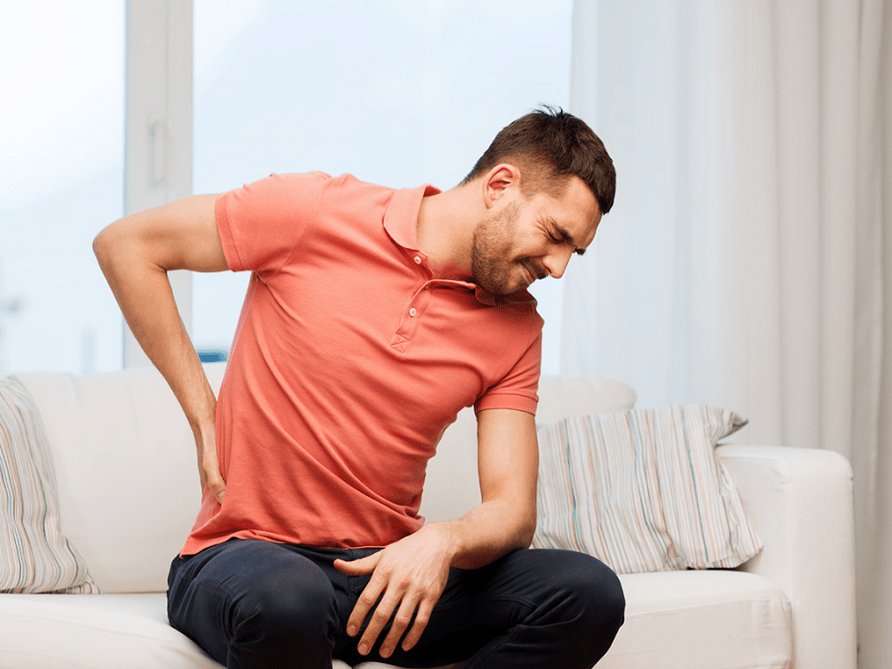
Low back pain can be associated with a variety of causes - for example, muscle damage, intestinal pathology, bulging and herniated vertebral discs. The exact cause cannot be determined independently. Therefore, if you have any concerns, you should be diagnosed and follow your doctor's advice. In most cases, medications and procedures are used for treatment. However, surgery may be required.
Back pain: causes
Low back pain can be related to the spine, muscles, nerves and other systems. The most common reasons are:
- Traumatic injuries of the spine or other parts of the spine.
- Damage to muscle tissue or severe strain.
- Hernia, bulge.
- Curvature.
- Neuropathy
- Inflammatory processes of vertebral tissues.
- Compressed nerve.
- Pathologies of the intestine, stomach, liver and other digestive organs (in this case, pain in the lower back).
- Poisoning, drunkenness.
- Pathologies of the excretory system - renal failure, pyelonephritis, cystitis, kidney stones, ureters.
- Uterine diseases - cysts, fibroids, inflammatory processes.
What to do if your back hurts
It is not possible to reliably determine the source of pain at home. Therefore, it is recommended to consult a doctor in case of external sensations. If diagnosed early, treatment will be successful and fast. You should contact such specialists:
- Surgeon or Traumatologist - If the pain has recently been related to plants, including sports or houseplants.
- Neurologist - sharp, shooting, painful feelings. Sensitivity problems in the legs, loss of mobility may be accompanied. Symptoms such as gas on the surface of the abdomen or legs are also observed.
- Gastroenterologist - chronic pain on one side of the lumbar region. In addition, the sensations are painful, accompanied by frequent or difficult urination.
- Gynecologist - in this case, the pain is observed on both sides. In addition, walking and running are accompanied by weakness that worsens during menstruation and pregnancy.
In rare cases, do not worry if the cause of the pain is objectively clear. Thus, it is not necessary to consult a doctor if the external sensations are related to prolonged stay in one position or physical activity. However, if the pain does not last for a few days or is acute, it is necessary to make an appointment and get diagnosed as soon as possible.
Low back pain: diagnosis
Diagnosis is made by a doctor after examination, complaints and medical history. The need for a special procedure depends on the symptoms of the pain:
- Spinal radiography - hernias, protrusions, back injuries, posture problems.
- Lumbar MRI - for hernias, curvatures, injuries, as well as suspected neoplasms.
- Lumbar CT scan - the same indications as MRI.
- Ultrasound - suspicion of pathology of the intestines and other organs located in the abdominal cavity.
- Colonoscopy, gastroscopy - these tests are performed when diseases of the gastrointestinal tract are suspected. In this case, the doctor can not only examine the organs, but also take a tissue sample (biopsy) for further examination.
- Intestinal MRI is performed to examine the gastrointestinal tract more closely to confirm or verify a previously diagnosed diagnosis.
Methods of treatment
Methods, duration, treatment regimen are determined by the doctor depending on the diagnosis. In most cases, medications are prescribed, such as non-steroidal anti-inflammatory drugs. It is also possible to participate in massage sessions and physiotherapy procedures.
If the diagnosis involves only surgical treatment, surgery is performed. This is necessary, for example, in the presence of hernia, gastric ulcer and other pathologies.
Prevention of back pain
Low back pain can be related to working conditions and lifestyle. The main physical activity is in the lumbar region. This is dangerous when constantly lifting weights, exercising, or having household injuries.
Recommended for prevention:
- Exercise regularly.
- If the work involves physical labor, learn how to lift weights properly and not overload your back.
- If the work involves staying in a sitting position for a long time, get up, walk, and change your posture regularly.
- Avoid back hypothermia, wear according to weather conditions.
- Keep your back straight while sitting and standing.
- Eat a balanced diet.
- Do not abuse alcohol, smoking and other bad habits.
If the pain recurs very often and is more severe, you should see a doctor immediately. It is important to understand that treatment lasts several months, especially when recovering after surgery. In this case, it is worth adjusting the lifestyle, change the job if necessary.



































